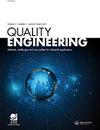A reliability prediction method considering degradation self-acceleration effect in DC-link electrolytic capacitor
IF 2.2
4区 工程技术
Q4 ENGINEERING, INDUSTRIAL
引用次数: 0
Abstract
AbstractThe reliability of DC-link electrolytic capacitors is crucial to ensure the quality of power supply systems. The degradation of capacitor parameters may lead to a higher temperature and thus accelerate degradation as a self-accelerating effect. In this article, an improved reliability prediction method for DC-link electrolytic capacitors is proposed, as existing methods have not adequately accounted for the self-acceleration effect. The degradation under dynamic stress is obtained by cumulative computations and the stress is updated according to the degraded parameters. The degradation models are converted into degradation rate models to overcome the computational challenges associated with small-step iterations that may make traditional methods unaffordable. The proposed method for developing the degradation rate model is widely applicable and achieves satisfactory accuracy. To demonstrate the practicality of the proposed method, a case study of a boost motor drive system is presented. The appropriate iteration step can be determined by comparing the results of the lifetime distributions obtained using different iteration steps. Degradation paths considering self-acceleration effects can be obtained, enabling more precise system quality analysis and reliability prediction.Keywords: degradation analysiselectrolytic capacitorreliability predictionself-acceleration effect Additional informationNotes on contributorsXuerong YeXuerong Ye is currently a Professor at the Department of Electrical Engineering, Harbin Institute of Technology. He received B.S., M.S., and Ph.D. degrees in electrical engineering from the Harbin Institute of Technology, China. His research interests include robust parameter design and reliability prediction.Qisen SunQisen Sun is a Ph.D. student in the Department of Systems Engineering at the City University of Hong Kong, Hong Kong, China. He received an M.S. degree in electrical engineering from the Harbin Institute of Technology, Harbin, China. His research interests include statistical engineering and reliability prediction.Ruishi LinRuishi Lin is the Deputy Chief Engineer of the Beijing Institute of Aerospace Automation, Beijing, China.Cen ChenCen Chen is currently an Associate Professor at the Department of Electrical Engineering, Harbin Institute of Technology. He received his B.S. and Ph.D. degrees in electrical engineering from the Harbin Institute of Technology, Harbin, China. His research interests include electronic system reliability prediction, fault diagnosis, and health management.Min XieMin Xie is a Chair Professor at the City University of Hong Kong. Before that, he was a Professor at the National University of Singapore. He received his undergraduate and postgraduate education in Sweden with a Ph.D. from Linkoping University in 1987. Prof Xie has published over 300 journal articles and eight books. Prof Xie has been an elected fellow of IEEE since 2006 and has been elected to the European Academy of Sciences and Arts.Guofu ZhaiGuofu Zhai is currently a Professor in the Department of Electrical Engineering at Harbin Institute of Technology. He has published more than 40 peer-reviewed journal articles. His research interests include quality control and process monitoring, robust parameter design, and reliability.Rui KangRui Kang is a professor in School of Reliability and Systems Engineering, Beihang University, Beijing, China. He is currently serving as the associate editor of IEEE Trans. on Reliability and is the founder of China Prognostics and Health Management Society. His main research interests include reliability, resilience for complex system, and modeling epistemic uncertainty in reliability and maintainability.一种考虑退化自加速效应的直流电容可靠性预测方法
摘要直流链路电解电容器的可靠性是保证供电系统质量的关键。电容器参数的退化可能导致更高的温度,从而加速退化作为一种自加速效应。针对现有方法未充分考虑自加速效应的问题,提出了一种改进的直流链路电解电容器可靠性预测方法。通过累积计算得到动应力下的退化,并根据退化参数更新应力。将退化模型转换为退化率模型,以克服与小步迭代相关的计算挑战,这些挑战可能使传统方法难以承受。所提出的退化率模型建立方法具有广泛的适用性,并取得了令人满意的精度。为了证明该方法的实用性,文中给出了一个增压电机驱动系统的实例研究。通过比较使用不同迭代步骤得到的寿命分布的结果,可以确定适当的迭代步骤。可以得到考虑自加速效应的退化路径,从而实现更精确的系统质量分析和可靠性预测。关键词:退化分析电解电容可靠性预测自加速效应附加信息叶学荣叶学荣现任哈尔滨工业大学电气工程系教授。他获得了哈尔滨工业大学电气工程学士、硕士和博士学位。主要研究方向为鲁棒参数设计和可靠性预测。孙启森,中国香港城市大学系统工程系博士生。他在哈尔滨工业大学获得电气工程硕士学位。主要研究方向为统计工程和可靠性预测。林瑞石,中国北京航空航天自动化研究所副总工程师。陈晨,现任哈尔滨工业大学电气工程系副教授。他在哈尔滨工业大学获得电气工程学士学位和博士学位。主要研究方向为电子系统可靠性预测、故障诊断、健康管理。谢敏,香港城市大学讲座教授。在此之前,他是新加坡国立大学的教授。他在瑞典接受了本科和研究生教育,1987年在林雪平大学获得博士学位。谢教授发表了300多篇期刊论文和8本专著。谢教授自2006年起获选为IEEE院士,并获选为欧洲科学与艺术学院院士。翟国富,现任哈尔滨工业大学电气工程系教授。他发表了40多篇同行评议的期刊文章。他的研究兴趣包括质量控制和过程监控、鲁棒参数设计和可靠性。康锐,北京航空航天大学可靠性与系统工程学院教授。他目前担任IEEE Trans的副主编。他是中国预后与健康管理学会的创始人。他的主要研究方向为可靠性、复杂系统的弹性、可靠性和可维护性中的认知不确定性建模。
本文章由计算机程序翻译,如有差异,请以英文原文为准。
求助全文
约1分钟内获得全文
求助全文
来源期刊

Quality Engineering
ENGINEERING, INDUSTRIAL-STATISTICS & PROBABILITY
CiteScore
3.90
自引率
10.00%
发文量
52
审稿时长
>12 weeks
期刊介绍:
Quality Engineering aims to promote a rich exchange among the quality engineering community by publishing papers that describe new engineering methods ready for immediate industrial application or examples of techniques uniquely employed.
You are invited to submit manuscripts and application experiences that explore:
Experimental engineering design and analysis
Measurement system analysis in engineering
Engineering process modelling
Product and process optimization in engineering
Quality control and process monitoring in engineering
Engineering regression
Reliability in engineering
Response surface methodology in engineering
Robust engineering parameter design
Six Sigma method enhancement in engineering
Statistical engineering
Engineering test and evaluation techniques.
 求助内容:
求助内容: 应助结果提醒方式:
应助结果提醒方式:


